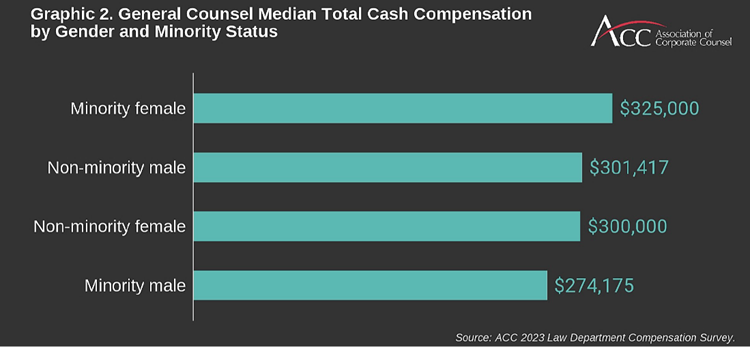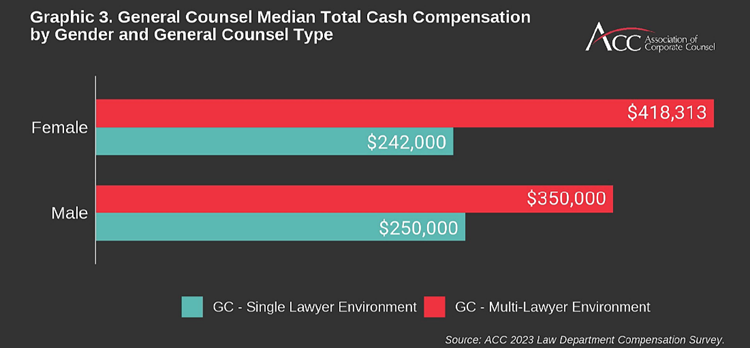Banner artwork by LOVE YOU / Shutterstock.com
There is good news, and certainly some bad news, when it comes to the gender pay gap. The good news is that a recent report by Russell Reynolds Associates found that 67 percent of the 43 lawyers named general counsel (GC) of Fortune 500 (F500) companies last year were women — marking the first time women outpaced men in these appointments. This comes a year after women made up almost half of those named to the top legal spot of said companies. And more good news — the study found that 38 percent of general counsel appointees were ethnically diverse, another first.
The numbers are encouraging, indicating that women are making important strides in the legal industry and business community. However, as women continue to work toward greater equality in the workplace, there is one glaring area where equity is unfortunately still a developing reality — compensation.
Equal pay for equal work
Pay equity, according to Harvard Business Review’s, “What it Takes to Be a Fair-Pay Workplace,” ensures that “individuals are paid fairly for the work they do, regardless of their gender, race, ethnicity, or any other characteristic that may lead to discrimination.” The article goes on to state that pay equity is intended to eliminate pay gaps or disparities that may exist between different groups of employees performing similar work. We do the same work; we get the same pay. Simple concepts to grasp and implement, right?
When it comes to the in-house legal community, executive search firm BarkerGlimore’s 2023 In-house Counsel Compensation Report found that male general counsel still receive higher compensation than their female counterparts, with the median total compensation for male GCs at US$573,000 in 2022, compared to US$546,000 for women GCs, a five percent pay gap. It’s important to note that an even greater disparity existed as it relates to bonus pay, with men on average receiving 13 percent more than women.
Other research from Major, Lindsay & Africa found larger pay gaps, noting that men in the top legal spot boast a six percent higher base pay and 18 percent larger bonuses than women holding the same title — and responsibilities.
Association of Corporate Counsel (ACC) research digs a bit deeper, looking at pay disparities for in-house counsel across the board, including among minority women (and men). ACC 2022 Law Department Compensation Survey, in partnership with Empsight, revealed that of those surveyed, women general counsel/chief legal officers make four percent less in total compensation than their male counterparts — with minority women specifically making 16 percent less than non-minority men.
ACC 2022 Law Department Compensation Survey, in partnership with Empsight, revealed that one of those surveyed, women in general counsel/chief legal officers make four percent less in total compensation than their male counterparts — with minority women specifically making 16 percent less than non-minority men.
The 2023 Law Department Compensation Survey by ACC and Empsight International, LLC, reveals a closing gender pay gap among general counsel, with parity in median compensation between men and women.

Minority female general counsel reported higher earnings by eight percent compared to peers, and significantly more in both single and multi-lawyer departments. Notably, in multi-lawyer settings, non-minority women outearned their male counterparts by about 36 percent and minority males by more than 50 percent. Conversely, minority males lag in earnings, particularly in single-lawyer departments where they earn at least 37 percent less than their colleagues.

*Median Values Reported
Why demonstrating a commitment to pay, equality, and inclusion is critical
Organizations must continue to focus on how to ensure equity in the workplace. They must create an environment that is inclusive of all employees, provide equal access to opportunities for advancement and promotions, and certainly ensure fair pay standards. According to a recent ADP Survey, 72 percent of companies surveyed consider pay equity a critical component of their business and people strategy. Further, 76 percent of employees said that they would look for another job if they discovered unfair gender pay gaps within their organizations, or if said organization lacks a culture supportive of diversity and inclusion.
A commitment to ensuring pay equality and working to eliminate pay gaps is critical.
Therefore, in a competitive labor market, if organizations want to attract and keep top talent — and the data quoted at the top of this article proves that women are a big part of that talent pool — a commitment to ensuring pay equality and working to eliminate pay gaps is critical.
A few ideas to consider
It takes an intentional, robust, and comprehensive approach to make a meaningful difference when it comes to driving equity at all levels of your organization. At ACC, we strive to foster an environment that is inclusive in every way, and we adopted several policies related to compensation.
1. Prohibit HR from asking questions concerning current salary during the interview process.
Different organizations have different internal pay structures, not to mention varying ways of defining positions, organizational levels, and more. These questions can often lead to continued wage disparities and potentially deny a candidate the salary that has been determined for that position.
2. Regularly benchmark employee salaries against markets to ensure you remain competitive, especially as it relates to tenured employees.
In collaboration with Quatt Associates, ACC conducts a competitive analysis of staff salaries every three years. This analysis includes historical salary data for each employee, as well as market data based on the position and time in said position.
3. Once a “best offer” base salary is shared with a candidate for employment, do not authorize HR to engage in counter negotiations.
Your best offer should be competitively based on market data, as well as aligned with your internal salary structures, which ensures balance and equity across the organization.
4. Consider unconscious bias training for all leaders and staff.
ACC provided a two-part unconscious bias training for all ACC staff and the board of directors. This training included a session on common biases with methods to combat them and a strategically focused session based on ACC’s organizational goals.
Again, the above is provided as an example of systematic changes you can make to lessen disparity within your organization. The Society for Human Resource Management (SRHM) is a fantastic resource in this area. In their Managing Pay Equity Toolkit, they suggest one way to get started is for HR professionals to conduct a self-audit of their organization’s pay practices and internal policies by answering a few direct questions.
It's no secret that better business outcomes are achieved through a diversity of thought and perspective. To achieve that, diversity, equity, and inclusion cannot remain buzz words, they must come to life within our policies, practices, and procedures. Invest in those checks and balances to ensure that your company attracts the best and the brightest or lose out to companies who get it. Equal pay for equal work is a significant part of that equation and cannot be a catchphrase, it must be the reality.
"The total compensation values reported in ACC's 2022 and 2023 self-reported surveys included only base salaries and short-term incentives/cash bonuses and did not capture long-term incentive valuations."




